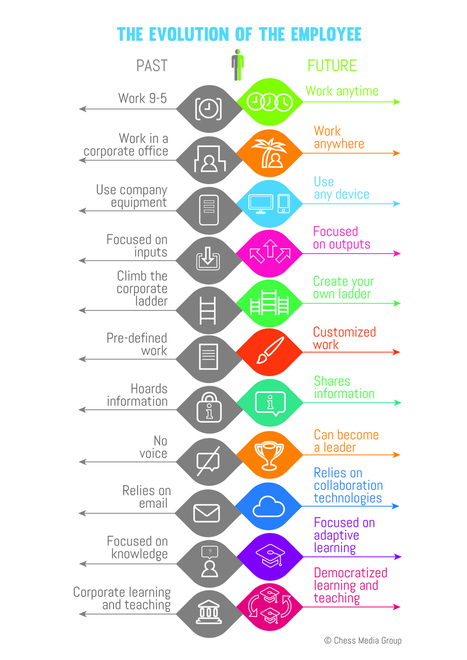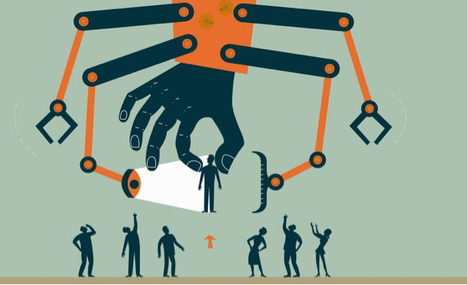 Your new post is loading...
 Your new post is loading...
I have never heard of anyone who has had a bad customer experience with Amazon, Apple, Costco, or Salesforce. The aforementioned companies are incredibly successful due, in large part, to a material focus on the customer experience. Not surprisingly, the stock market has handsomely rewarded these four companies over the past decade. Amazon is so customer focused that it will literally send you a replacement for a lost package immediately without ever implying that the customer is at fault. The result is a consumer experience that is so optimal that Amazon is the only place where many consumers decide to shop online. The same can be said for Apple when it comes to the in-store experience. Apple employees are so passionate about the products that I feel like I am talking to a polite tech enthusiast in the Apple stores and not Apple employees. The result is incredibly brand-loyal customers.
Via The Learning Factor
At VaynerMedia, we like to say, "Family first, agency second." Your employees are important, because it is their skills that keep your machine running. I started VaynerMedia in 2009 with my brother, AJ; a handful of his closest friends became our earliest employees. Having taken two businesses from $3 million to $60 million in revenue, each in less than five years, I've learned that employee happiness and well-being come before everything else--including signing on new clients. This emphasis has allowed me to scale up the businesses and build committed teams as we continue to innovate. But as much as you care for them, don't expect your staff to be as committed to your business as you are. Too many entrepreneurs complain that staff members don't work as hard as they do. It's a ludicrous expectation: Why should they be concerned about a business that's not theirs?
Via The Learning Factor
Yet almost everything Google does, it does in teams. The group started thinking, "How could HR be different if we reoriented at least some of our services toward the level of the team?" said Brian Welle, Google's director of people analytics, addressing an audience last week at Wharton's People Analytics Conference in Philadelphia. The goal it came up with was characteristically big, hairy and audacious. The group imagined a future in which People Operations could advise leaders starting projects on exactly what kind of teams they should assemble: both the number and type of people. The advice might go: "You are going to want one extrovert to keep the team excited and motivated," said Welle. "You want two conscientious people to make sure details are attended to. You want three women and two men so you have that diversity represented. You want to be co-located in the first six months, and then you want them distributed in the next six months."
Via The Learning Factor
Think back. Reflect on your career and write down your five biggest leadership disappointments. If your experience is typical, your list will include losing top-quality talent. The memory of “suddenly” losing one of your best and brightest never seems to fade. The story is always the same: They weren’t looking, but a great opportunity just fell into their lap.
Via The Learning Factor
What's the difference between a remote team that performs like a happy, cohesive unit, and one that performs poorly? Tsedal Neeley, associate professor at Harvard Business School and founder of consulting firm Global Matters, has focused on this subject--bridging social and emotional distances on geographically dispersed teams--for more than 15 years. In a recently released article in the Harvard Business Review, Neeley shared a proven framework that has helped leaders manage long-distance employee relationships. The framework, which has five components, is called SPLIT: structure, process, language, identity, and technology. Here's a primer on the framework, along with some insight from Neeley, who recently spoke to Inc. about it.
Via The Learning Factor
All organizations, even those currently enjoying low turnover, cannot afford to rest on their laurels. Experts warn that despite rising slightly for the past decade to the current average of 4.6 years per person/per organization*, employee tenure will begin to wane in the future as the job market continues its recovery and more Millennials enter the workforce. So, how can an organization increase employee retention and slow the “revolving door” of turnover? We explore this topic in great detail in our professional development course that examines employee engagement through the lens of Disney Culture. But, for the purposes of this blog, we offer this advice: Leaders should start by asking the question “Beyond a paycheck, what do my employees value?”
Via The Learning Factor
Embrace Different Perspectives
"We'll never stop employing people of different generations here. Although it's a challenge to work together, meshing new ideas, different energy levels, and time-tested experience, I'm a firm believer that evolution only happens by getting outside the comfort zone. There's great value in the diversity of our employees. They provide insight on our wide range of customers, giving us a well-balanced perspective."
Via The Learning Factor
Working from home is everyone's dream, right? If that's true, then why did 60 percent of the employees who participated in a Stanford University work-from-home experiment opt to go back to corporate HQ? The 2013 study offered a sampling of employees in the air travel and hotel booking industry an opportunity to work from home for nine months. Surprisingly, many of them had a very lonely experience. After only a few months, 50 percent of the volunteers and 10 percent of the non-volunteer group asked to return to their cubicles. Loneliness and lack of social interaction were cited as the No. 1 reason for abandoning home offices, but these aren't the only drawbacks. How can you have your cake and eat it, too? Because I've successfully worked from home for nearly 16 years, I consider myself an expert on the topic.
Via The Learning Factor
This concept and the visual was taken from my new book which came out today called, The Future of Work: Attract New Talent, Build Better Leaders, and Create a Competitive Organization. One of the things I have been writing about and have tried to make clear over the past few months is that work as we know it is dead and that the only way forward is to challenge convention around how we work, how we lead, and how we build our companies. Employees which were once thought of expendable cogs are the most valuable asset that any organization has. However, the employee from a decade ago isn’t the same as the employee who we are starting to see today. To help show that I wanted to share an image from my upcoming book which depicts how employees are evolving. It’s an easy way to see the past vs the future.
Via The Learning Factor
Consulting firm PwC recently published its outlook for work in 2022, based on interviews with 500 human resources experts and 10,000 others in the United States and several other countries. You probably won’t be surprised to hear that big companies could end up so powerful and influential they morph into “ministates” that fill the void when government is unable to provide essential services. Companies will also use sensors and other gizmos to monitor employees around the clock. And workers will mostly acquiesce to this digital leash, in exchange for job security, decent pay and important benefits.
Via The Learning Factor
You want a team full of motivated employees and a rocking company culture. You're doing everything you can, but somehow it's just not working. Turnover is still high. Employees look good on paper, but seem to get demotivated no matter what you do. What could be going wrong? Your human resources team could be the culprit. It's time to take a hard look at your company's interviewing practices. Sometimes HR wants to "sell" a really great candidate on the position. So they start telling them all of the great things about being a part of the company or fulfilling the role they're trying to fill. There's nothing wrong with that on the surface. The problem arises when HR starts making promises on your behalf. Promises you can't keep, or won't keep, for whatever reason.
Via The Learning Factor
To meet this goal, a performance management system must provide some way to determine how employees are performing relative to their co-workers. Yet there is currently a trend in HR to “fix” performance management by eliminating the use of methods that compare employees based on performance.
This makes no sense since this is the very thing senior business leaders want from performance management! The 2 performance management methods:
Via The Learning Factor
You did it--you convinced upper management to approve a new hire for your team, you interviewed countless candidates, and you offered the job to the perfect person with that "special sauce." While none of that was probably very easy--unfortunately, the hiring process pales in comparison to task of onboarding your new employee. Training a new employee can be extremely tricky and filled with self-doubt. I am currently training a new hire for my team, and my thoughts often jump between "How in the world am I going to explain this?" to "Should I just do this myself?" These questions coupled with a new lack of privacy ("Can I be copied on that email?") and scrutiny from your own managers ("How is she coming along?") can be overwhelming.
Via The Learning Factor
|
It's a problem that hits all of us. We all like to think of ourselves as fantastic bosses: authoritative, decisive, inspiring, and respected. But we really can't know how the people we manage actually see us. In fact, a survey of 1,214 leaders by the Hay Group found that the more senior a manager is in an organization, the more the person tends to overrate him- or herself. The survey that the group uses to assess managers is based on work by Harvard researchers George Litwin and Robert Stringer. The psychologists identified what they saw as the six most effective styles of leadership: 1. Coercive Gains immediate compliance from employees. Bosses with this style give orders and take no refusals.
Via The Learning Factor
And then there was Bill Campbell, who died of cancer on Monday at 75. He was one of the most influential figures in Silicon Valley, yet was outside the norm in just about every way. Even though he was CEO of Intuit and was chairman of its board until his death, "Coach," as everyone called him, could not write a line of code. He grew up in the Rust Belt of Pennsylvania and attended Columbia only because his father knew the football coach there and he wanted to play. He got a degree in education and headed into a career as a college football coach. But somewhere along the way he took a left turn and wound up at Apple (where, among other things, he kept the company from chickening out and canceling its famous "1984" Super Bowl ad). His death is a sad, sad loss. But we can all still benefit from his wisdom. 1. Care about people more than anything
Via The Learning Factor
Global team leaders who unleash ideas, we find, are those who: 1) ask questions, and listen carefully; 2) facilitate constructive argument; 3) give actionable feedback; 4) take advice from the team and act on it; 5) share credit for team success; and 6) maintain regular contact with team members. Members of global teams whose leaders exhibit at least three of these behaviors are more likely than global team members whose leaders exhibit none of these behaviors to say they feel free to express their views and opinions (89% vs 19%) and that their ideas are heard and recognized (76% vs 20%). Research we conducted at the Center for Talent Innovation reveals a remarkable correlation between inclusive leadership, innovative output, and market growth.
Via The Learning Factor
Whenever you're approaching any unique partnership, there's a couple things that I look at. One is, What is the joint set of capabilities that you're bringing to the table? It's not just about what Porch can do for that company, or what that company can do for Porch. It's, what is the joint set of capabilities? And you put it on the table, and you look at that. I think the second thing is, you come up with a vision of what that partnership can do together. "The partner is a customer. So when I talk about who our customers are, we often talk about the homeowners; we talk about our professionals. But the partner satisfaction, it's got to be core to how you operate as a company. So we've made a commitment to that."
Via The Learning Factor
Here's the central law of employee motivation, of coaxing a great performance from your employees, day after day: Employees who are selected, oriented, and reinforced properly, and who are surrounded by peers of the same caliber, will thrive when given significant autonomy. Otherwise, they'll wither. There are dozens of studies to support this, inside and outside of business life. The case for autonomy: just look in the mirror.
Via The Learning Factor
Although many factors contribute to a negative employee culture, including poor management, lack of advancement opportunity, low pay, and other factors, there is another strong correlation: how well people are trained to do their jobs. It turns out, if people feel well-prepared and well-equipped to succeed in their roles, that feeling improves their morale. The problem? Companies select and hire people, but then underinvest in or significantly underestimate-;the amount of professional development training necessary to help employees develop their personal skills and exhibit the organization’s desired behaviors. The impact can be felt in two major ways:
Via The Learning Factor
Employees who are lucky enough to snag an office with a view not only have a sunnier disposition, thanks to the rays of sunshine splashed across their desk. It turns out they also have better overall health than their coworkers whose desks are stuffed in drab corners lacking natural light. A recent study published in the Journal of Clinical Sleep Medicine shows workers with office windows get 46 more minutes of sleep per night, tend to exercise more, and have lower blood pressure than those without a view.
Via The Learning Factor
The transition to management isn’t easy. One study found it was almost as stressful as divorce. No wonder people screw it up. But while “Everyone certainly has the right to screw up in her own individual way,” says Lindsey Pollak, whose new management book Becoming the Boss is out this month, there are also “classic mistakes” made by “pretty much everyone I interviewed.” Here’s what they are, and how to avoid them: 1. Keeping The Star Mindset People often get promoted because they are awesome at what they do. But once you’re in management, “your job is no longer to be the star as a contributor. Your job is now to manage through other people’s successes,” says Pollak. This is a huge change in thinking, and unfortunately, many new managers “keep trying to do their old jobs and be a manager at the same time.”
Via The Learning Factor
Employee recognition programs may sound like an unneeded expense, but research shows that a little peer-to-peer recognition goes a long way. For example, organizations with a strong employee recognition approach are 12 times more likely to have strong business results, according to data cited by OfficeVibe. Companies with strategic recognition programs also report lower turnover rates than companies that don't. The infographic below explains why investing in employee recognition is worth it.
Via The Learning Factor
In addition to all of your achievements, you're sure that you're a great boss. After all, your leadership skills have helped you climb the ladder of success. But some of the world's top companies succeed in spite of poor leadership, a result of great products or concepts rather than motivated team members. According to entrepreneurial counselor Michelle McQuaid, bad bosses cost businesses $360 billion in lost productivity every year. The stress caused by difficult supervisors can negatively affect an employee's overall health and workplace morale, eventually driving him or her out the door. Since losing one employee costs a business tens of thousands of dollars or more, your business will eventually suffer financially if you can't keep employee loss at a minimum.
Via The Learning Factor
You thought finding a place to sit in the cafeteria as the new kid or struggling to make friends in a new environment was over when you graduated high school--boy, were you wrong. Kids might grow up, but there are still cliques: mean girls, bullies, the cool lunch table. As the new kid on the block, joining a new department or company can be challenging, and not just because you have a brand new job to do. You also need to find your stride amongst your peers while also making a positive impact on the bosses. And you thought middle school was tough. Fortunately, you're older now, presumably wiser, and a lot more confident than you were as a bumbling teen. While every job environment is different, there are some hacks to adapting and fitting in from the start.
Via The Learning Factor
If you're on the hunt for a new position that will let you shine, practice demonstrating these top seven traits that CEOs look for in star employees. Your resume can get you the interview. But these traits can get you hired: 1. Happiness No one wants to work with an unhappy person. Negativity, unnecessary drama, and melancholy attitudes can bring the entire company down, so although your own personal happiness may not seem important when applying for a job, it most certainly is. Happiness also reflects your ability to tackle challenges without becoming discouraged. If you show the hiring CEO that you're a positive, mentally healthy person, your chances of becoming the company's next star employee will vastly improve.
Via The Learning Factor
|



 Your new post is loading...
Your new post is loading...


















































It can take 30+ years to build a brand and just a handful of poor customer experiences to destroy it.